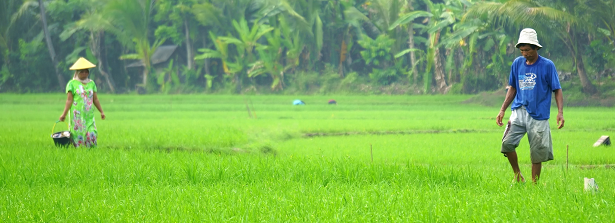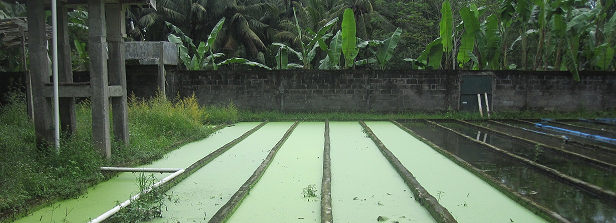Greening farms in Indonesia (PROFARM)

Duration: August 2015 – July 2018
Project information
Aim: Hivos and partners would like to develop a pilot showcasing how duckweed can play a key role in the development of an integrated farming system, which leads to better nutrition for people and animals, reduction of CO2 emissions and more efficient and environmentally friendly production. Duckweed (Lemna) is a protein-rich plant, which has the potential of huge benefits. One hectare of the rapidly growing duckweed produces just as much protein as eight hectares of soya.
Objective: The overall objective of the project PROFARM is to prove that the welfare of Indonesian farmers can be improved by the application of Lemna and biodigestate to enhance profitability of sustainable integrated farming, while a secondary objective is to introduce Lemna as high protein fodder for cattle and fish that serve as nutritious food for cattle, fish and other animals.
Method: Lemna species have been used worldwide in agriculture for quite some time. Based on data from the literature several observations have been made and PROFARM envisages to optimize all these characteristics in an integrated farming system. Thus PROFARM proposes to mitigate waste streams at the farm level whilst introducing new income sources from integrated farming. Food, feed and energy production are integrated in sustainable Lemna – fish – cattle farming in such a way that waste streams are reduced. In this system farmers, but also other sectors, will be less dependent on external resource supply using the cradle to cradle concept. To become successful as an integrated farming system all streams have to be optimized. Concrete activities are subdivided in three steps: assessment, pilot projects, and upscaling.
Country: Indonesia.
Dutch policy goals: Increased sustainable agricultural production; and Improved access to better nutrition.
Progress reports
Year 1: Extreme rise in livestock feed prices in Indonesia can be reduced by utilising Lemna, a high protein aquatic plant commonly known only as a useless weed. Knowledge about Lemna (duckweed) is introduced to farming households in combination with a bio-digester to assess the profitability of producing Lemna to enhance the growth of animals (cows and fish) and the quality of bio-digestate to increase crop yields. All streams within the integrated farming system Lemna and bio-digestate will be analysed in labs and yields will be monitored. The research results will be used to guide farming families in Indonesia to develop a profitable, sustained integrated farming system.
Year 2: The PROFARM project supports the application of Lemna and biodigestate to enhance profitability of sustainable integrated farming in Indonesia. It has leveraged a considerable amount of additional funding from the Hivos-Millennium Challenge Account-Indonesia (MCA-I) GADING project, enabling the project to cover four provinces and over 1,650 farmers in Indonesia. Led by Hivos, partners in the PROFARM/GADING projects include Wageningen University, four local research institutes, and local implementing partner Yayasan Rumah Energi. Through the establishment of 574 lemna and aquaculture ponds, capacity building of over 1,650 farmers–men and women–and targeted research activities in Indonesia and the Netherlands, the project has generated insights into the nutrient content, cultivation and growth behaviour of lemna sp., and the application of lemna sp. as an organic feedstock for fish, poultry, pigs and cattle. The results will be supplemented with economic analysis conducted in the third and final year of the project.

